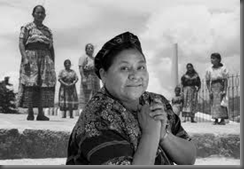Rigoberta Menchu

Biography:
Rigoberta Menchú Tum (born 9 January 1959, Laj Chimel, El Quiché, Guatemala) is an indigenous Guatemalan, of the K’iche’ ethnic group. Menchú has dedicated her life to publicizing the plight of Guatemala’s indigenous peoples during and after the Guatemalan Civil War (1960–1996), and to promoting indigenous rights in the country. She received the 1992 Nobel Peace Prize and Prince of Asturias Award in 1998. She is the subject of the testimonial biography I, Rigoberta Menchú (1983) and the author of the autobiographical work, Crossing Borders. Later, American anthropologist David Stoll visited Guatemala and uncovered evidence that some of the claims presented in Menchú’s Nobel Prize-winning testimonial were inaccurate or false.
Menchú is a UNESCO Goodwill Ambassador. She has also become a figure in indigenous political parties and ran for President of Guatemala in 2007.
In 2009 she was involved in the newly founded party Winaq.(source)
Books:
These interviews – conducted in Spanish, a language she has spoken for only three years – center on her role as a Quiche woman. Born in the mountains of Guatemala into the Quiche, one of twenty-three mestizo groups, Rigoberta Menchu tells the story of the Quiche fight to keep the Guatemalan gov’t and big-business people from stealing any more of their land: "This is my testimony. I didn’t learn it from a book and I didn’t learn it alone… My personal experience is the reality of a whole people."
 Part memoir, part political manifesto, this impassioned testimony by the Guatemalan Maya human-rights activist and winner of the 1992 Nobel Peace Prize is a stirring sequel to her 1984 autobiography, I, Rigoberta Menchu.
Part memoir, part political manifesto, this impassioned testimony by the Guatemalan Maya human-rights activist and winner of the 1992 Nobel Peace Prize is a stirring sequel to her 1984 autobiography, I, Rigoberta Menchu.


